Verizon vs AT&T Pros and Cons
Verizon
- The most robust network with the widest rural coverage
- 5G network laggard
- Generous hotspot data
- Rich collection of phone choices
- Paid streaming services
AT&T
- Largest US carrier network with 59% nationwide coverage
- 290+ million Americans covered by 5G signal
- Cheapest family plan
- Generous hotspot data allotment
- Limited phone roster
- No streaming perks
Pricing and Plans Comparison
- Cheapest 5G plan on Verizon: Welcome unlimited, priced from $30 per line for four lines, throttling any time
- Cheapest 5G plan on AT&T: $25/month per line for 4 lines, throttling any time
AT&T’s unlimited 5G data plans come out slightly cheaper than Verizon‘s, but Verizon offers a tad more perks. AT&T also offers the cheapest family plan that is just $25 a line per month, against Verizon‘s $30, both with throttling that can happen any time when the network is very busy. All in all, AT&T has the plan price advantage before Verizon, as you can see in the premium Unlimited 5G plan price comparison below.
Verizon vs АТ&T Unlimited 5G premium plan prices
| Verizon Unlimited Ultimate | AT&T Unlimited Premium | |
|---|---|---|
| 1 line | $90 | $85 |
| 2 lines | $160 | $150 |
| 3 lines | $195 | $180 |
| 4 lines | $220 | $200 |
| Throttling | No | No |
| Freebies | Disney+, Hulu, and ESPN+ for $10/mo. Netflix & Max for $10/mo International talk, text & 10GB data in 210+ cuntries Both new and existing customers eligible to receive the best current in-market smartphone offer with trade-in. Up to $540 BYID promo credit Unlimited talk and text Unlimited premium data |
60GB high-speed mobile hotspot data Free unlimited high-speed roaming in Canada and Mexico Free roaming in 19 Latin American countries, $10/day elsewhere Unlimited texting from the U.S. to 200+ countries AT&T ActiveArmor security app |
| Video streaming | 1080p | 4K |
| Hotspot (per line) | 60GB | 60GB |
*All prices are after Auto Pay and w/ paperless billing, include unlimited talk&text in the US
Coverage Comparison between Verizon and AT&T
According to the FCC, AT&T has the best network coverage in the US. While Verizon is considered the carrier with the most robust rural network, AT&T leads in cell phone signal availability over no less than 59% of the US territory, against Verizon‘s 56% when it comes to their 4G LTE networks.
AT&T vs Verizon US coverage (percentage) | Image credit – FCC
Indeed, what the FCC Verizon vs AT&T coverage map overlay here shows is that Big Red only has pockets of 4G signal coverage larger than AT&T in the Northwest, AT&T covers more of Verizon‘s dead spaces across the US, explaining the larger network percentage at the FCC database. In short, both AT&T and Verizon offer the largest, most widespread cell phone signal networks in the US, with a slight advantage for AT&T unless you live in the mountains of the Northwest.
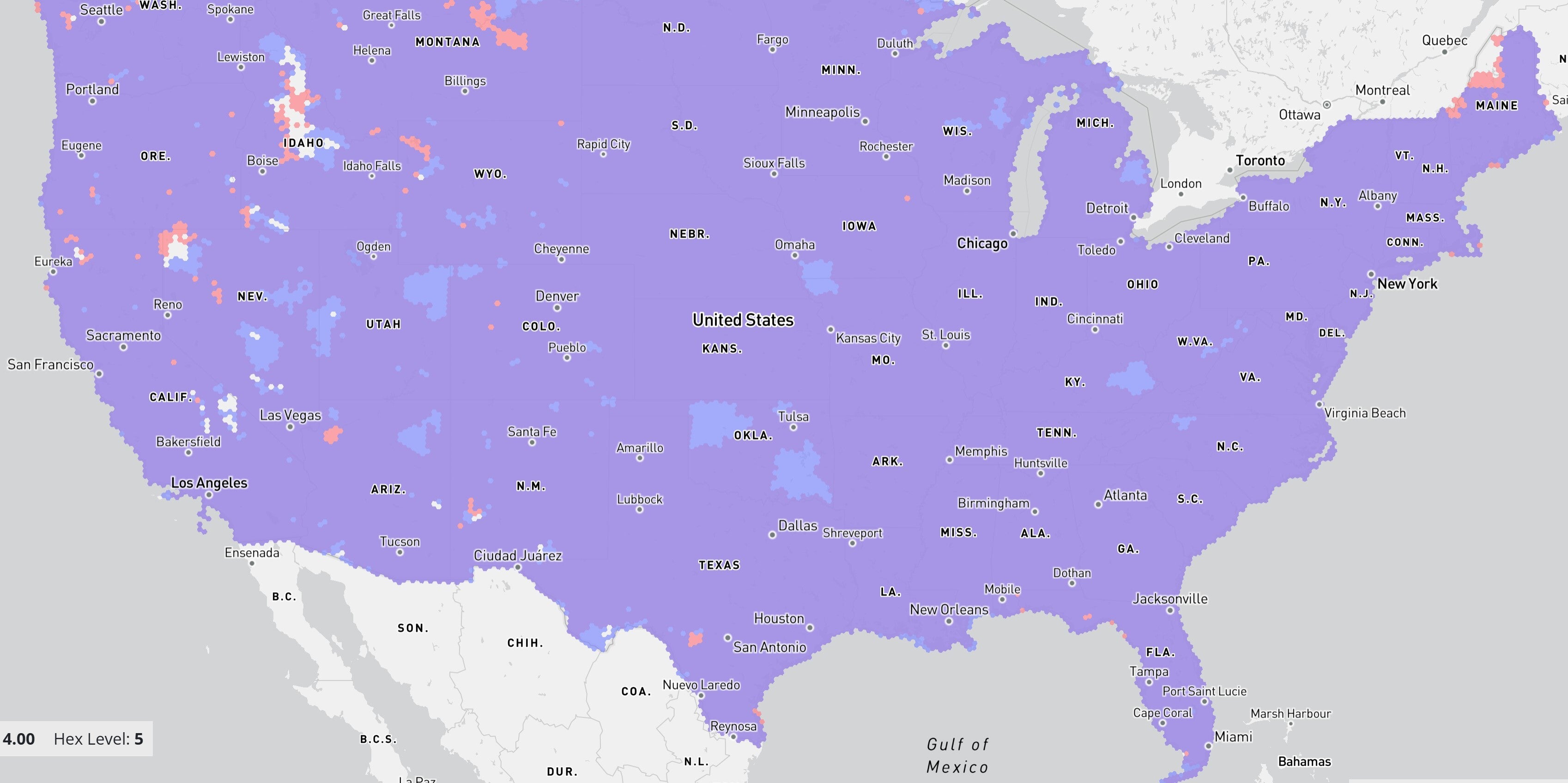
Verizon vs AT&T 4G LTE coverage map | Image credit – FCC
When it comes to basic 5G coverage at the low bands, AT&T is pulling ahead of Verizon as well, with 29% against Verizon‘s 9%. Same with the midbands where it holds an 18% against 6% coverage area advantage before Verizon.
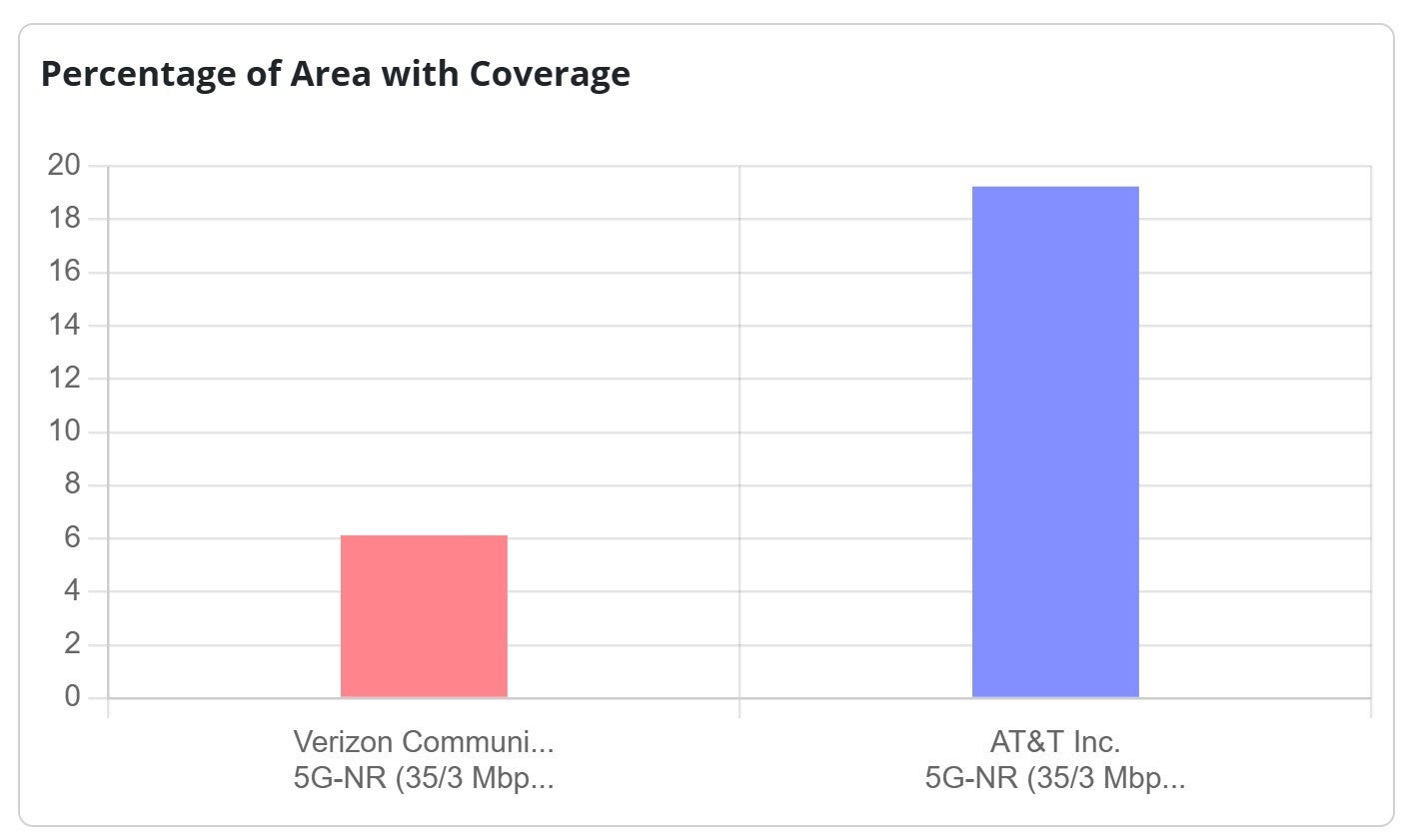
AT&T vs Verizon midband 5G coverage (percentage) | Image credit – FCC
It’s not T-Mobile‘s fourfold advantage, but AT&T says that it now blankets more than 290 million people with 5G in the US, and seeing as its 5G network is spread around big city conglomerates and along highways, that explains its more robust 5G coverage compared to Verizon which is still a bit overly reliant on its stellar 4G LTE network.
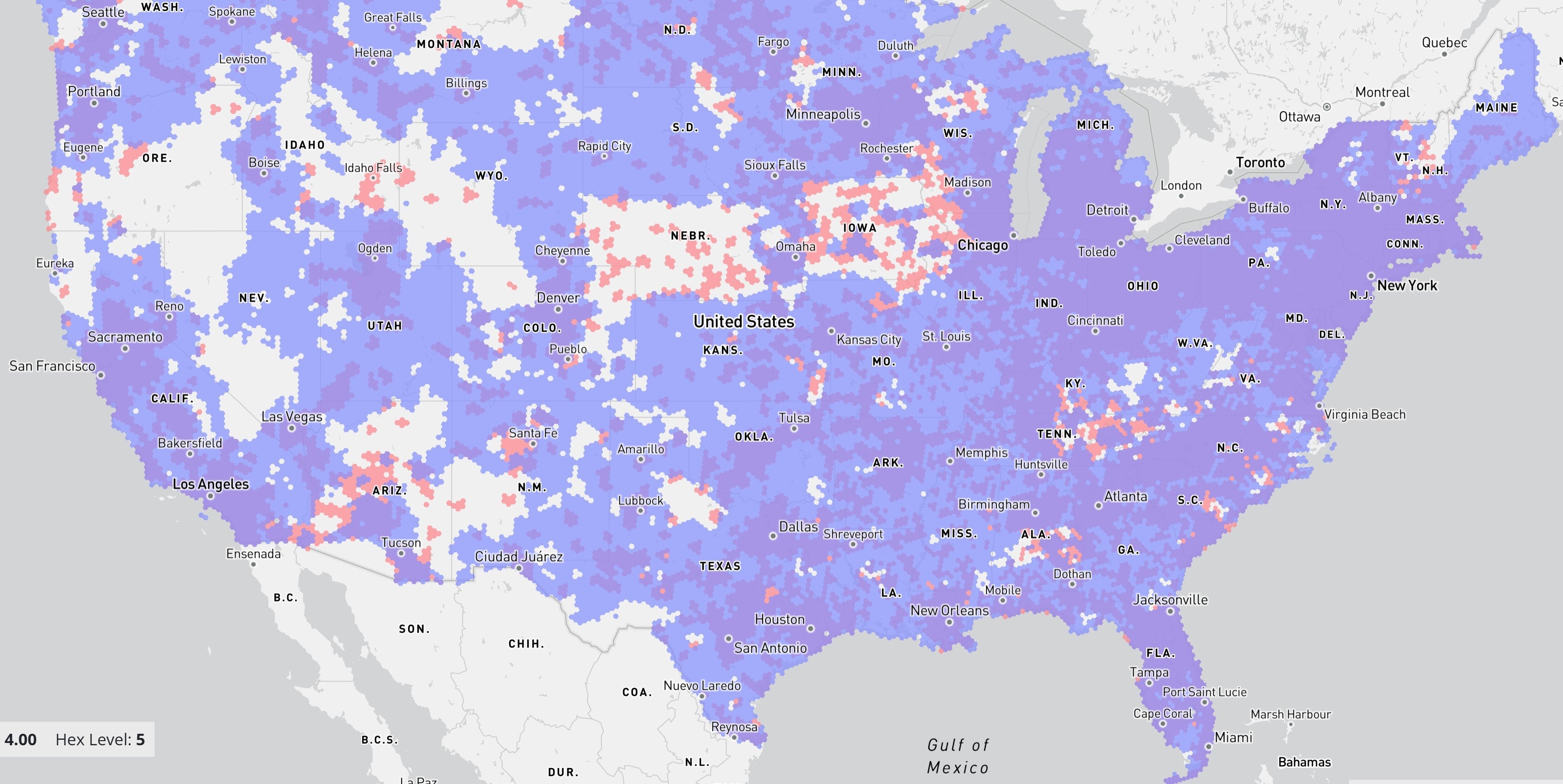
Verizon vs AT&T midband 5G coverage map | Image credit – FCC
Network Performance
While AT&T has the better 4G LTE and 5G coverage compared, the AT&T vs Verizon download speeds and network reliability paint a different picture. The 5G network that Verizon built includes the ultrafast mmWave spectrum, which adds to its download speed advantage over AT&T.
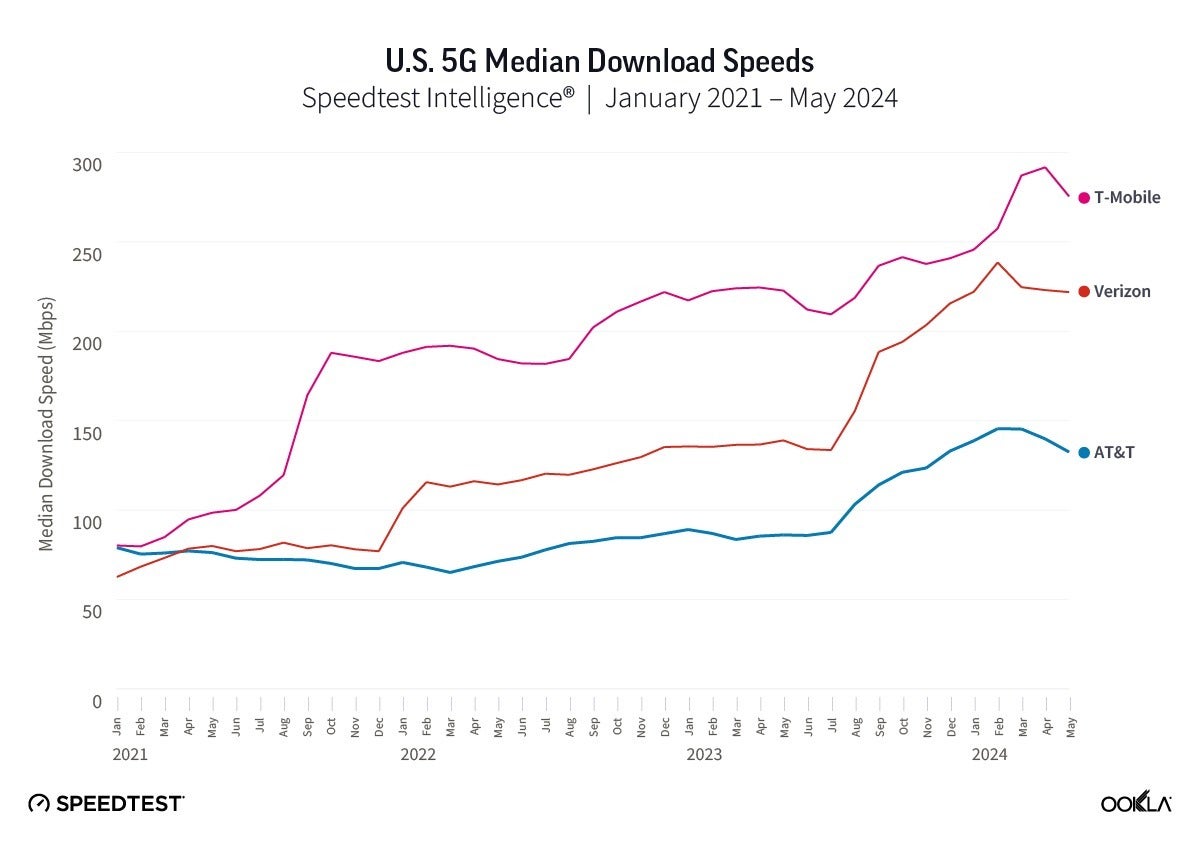
AT&T vs Verizon vs T-Mobile 5G network speeds | Image credit – Ookla
The situation with the wider 4G LTE network is the same as Verizon is an overall network reliability and speeds champion here, but both carriers will provide you with robust signal in most of the US, so it really depends on where you live and travel the most.
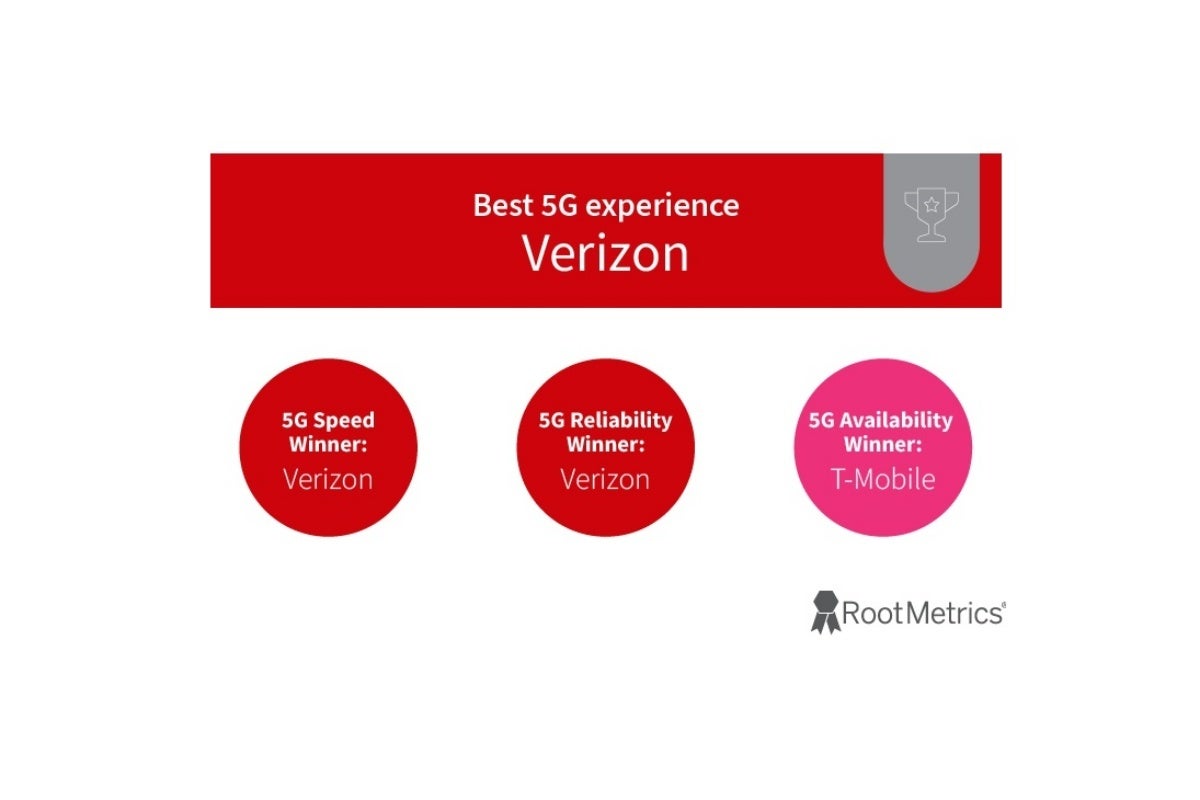
Verizon is the US 5G network reliability champion | Image credit – RootMetrics
Phone Selection
It used to be that AT&T, as a GSM carrier, had a much richer phone selection than Verizon that even now demands special editions with mmWave antennas to take advantage of its ultrafast 5G bands.
Best Verizon phones to buy in 2024: With contract and prepaid
AT&T vs. Verizon: Who Has Better Features and Perks
Ever since AT&T ditched the free HBO Max subscription with its premium unlimited plans this summer, it became the carrier with the poorest number of plan features and perks. Granted, Verizon charges $10 for, say, Netflix and Max after six months, but at least it offers the two most popular streaming services without ads for a low price, whereas AT&T only compensates with line prices that are on average about $5 cheaper than Verizon‘s, and that’s that.
Verizon and AT&T offer absolutely the same generous 60GB mobile hotspot allotment, as well as free calling, but Verizon is much more generous with the data allotment when travelling internationally, allowing you to use 10GB in most countries, something AT&T charges $10 for even in its premium unlimited plan pricing.
Customer service
According to the J.D. Power 2024 U.S. enterprise internet study, big businesses prefer AT&T for their internet service, while small businesses prefer Verizon. When it comes to retail wireless customer service, however, Verizon is ahead of AT&T.
In the past, wireless providers often experienced lower customer satisfaction when promotional periods ended, leading to higher service costs. However, we are now seeing many wireless brands addressing this issue, with a particular focus on managing costs and improving the overall customer experience
Carl Lepper, senior director of technology, media and telecom at J.D. Power
The Verizon Wireless business customer service also ranks second with 739 points, only after T-Mobile, and is highest in the medium business segment, while big enterprises apparently still prefer AT&T.
Verizon or AT&T: Which Carrier Should You Choose?
Verizon holds several advantages over AT&T, mainly in plan perks, phone choices, and network performance. AT&T, however, offers wider cell phone signal coverage, a faster 5G network, and has lower plan prices, especially the Value family plan that is $25/line for unlimited 5G data.
Thus, if AT&T has better signal in your home area, and you can live without shedding extra for streaming service subscriptions, or you don’t travel much internationally, Ma Bell will be the way to go. Where Verizon‘s network is stronger or on par with AT&T, Big Red is worth shedding $5 per line more for, as it has more phones to choose from and better plan features and perks.
All in all, despite its current third place in terms of US carrier subscriber numbers, AT&T is a viable alternative to the big dog Verizon, especially if one is looking to save some money on monthly payments without going prepaid and is after wider 5G network coverage.